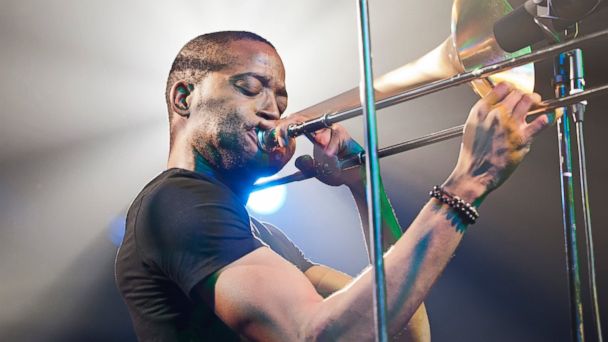'Trombone Shorty' Gives Back to New Orleans' Youth Music Community

Frank Hoensch/Getty Images
ABC News' Byron Pitts reports:
Musician Troy Andrews, 27, is a New Orleans prodigy. His fans from Bourbon Street to Berlin know him as "Trombone Shorty."
Long before he ever sold out arenas, he had the ability to steal the stage.
He started playing the trombone before he knew how to tie his shoes. At 4 years old he had performed with Bo Diddley. By 6, he was the Second Line band leader. A year later, he was already rising to stardom. He remembers one of the first times he got paid for a gig.
"We showed up, and they didn't want to pay us for some reason. I'm 6 or 7 years old, and the people say, well, who do we pay, and I'm real small and I say, well, right here, and it was like, no, you got to be kidding me," said Trombone Shorty who had to call his family to get his money after that gig.
Now he takes his gift and shares it with the next generation of New Orleans musicians. "I just want to give back," he said. He does this through the Trombone Shorty Academy at Tulane University. High-schoolers come to learn the technical skills that go with talent, an art form once passed along in the streets of New Orleans one generation to the next.
"A lot of older musicians are not around anymore, and the Treme neighborhood is a different place after the storm," said Trombone Shorty, referring to a musically rich neighborhood in downtown New Orleans.
"He's more like a big brother to me," said Tassion Lott, 17, one of Trombone Shorty's students. The pianist, 17, was adopted by her aunt.
"[Music] has helped me stay out of trouble. My friends, we've grown apart. We grew up differently and they're on a whole different path than I am. I have some who won't graduate, or aren't in school, and I think if music wasn't part of my life I'd be on the same track as them," said Lott.
"I met Trombone Shorty and when I started this program, I just gained a bigger passion for music, and I want to do this the rest of my life," said Lott, who is now weighing scholarship offers to college.
"She's going to be special you know. In a couple of years, she's probably going to be the face of New Orleans maybe," said Trombone Shorty.
New Orleans, a city that is far too familiar with struggle.
"It doesn't matter what their classification was. Middle class, the elite people, everyone struggled because they lost something. Katrina took something from them," said Lott.
The scars of Katrina still run deep in New Orleans.
"Everyone in New Orleans knows struggle. That's just the fabric that we deal with here," said Trombone Shorty. "We all deal with struggle in different ways, but music has been a light for us and to see and to be happy and to know there is a purpose that we can get through whatever it is we are doing or going through."